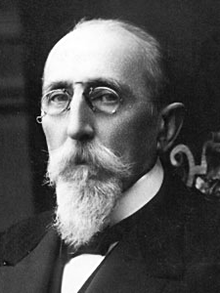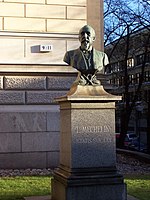Leo Mechelin: Difference between revisions
Extended confirmed users 957 edits No edit summary |
Rescuing 1 sources and tagging 0 as dead. #IABot (v1.6.1) |
||
| Line 25: | Line 25: | ||
== References == |
== References == |
||
{{Commons category|Leo Mechelin}} |
{{Commons category|Leo Mechelin}} |
||
* [http://www.eduskunta.fi/triphome/bin/hx5000.sh? |
* [https://web.archive.org/web/20120930195402/http://www.eduskunta.fi/triphome/bin/hx5000.sh?%7Bhnro%7D=911052&%7Bkieli%7D=su&%7Bhaku%7D=kaikki Eduskunta - edustajamatrikkeli] {{Fi icon}} |
||
;Specific |
;Specific |
||
Revision as of 19:22, 20 December 2017
This article has multiple issues. Please help improve it or discuss these issues on the talk page. (Learn how and when to remove these template messages)
|

Leopold (Leo) Henrik Stanislaus Mechelin (born 24 November 1839, Hamina, Finland – 26 January 1914, Helsinki, Finland) was a Finnish professor, statesman, senator and liberal reformer. A leading defender of the autonomy of the Grand Duchy of Finland, and of the rights of women and minorities, Mechelin's 1905–1908 government ("Mechelin's Senate") made Finland the first nation in the world with the
He also founded the Liberal Party of Finland (1880–1885), wrote its program, was one of the founders of the Union Bank of Finland 1862 (now part of Nordea Bank) and co-founded the Nokia Company (1871) with Fredrik Idestam, was the first chairman of the town council of Helsinki (1875–1876 and 1892–1899) and an internationally respected expert on politology and member of peace movement. Emperor Alexander II ennobled Mechelin 1876.
Mechelin led the passive resistance in Finland during the

Born in Hamina in 1839, the son of Gustaf Johan Mechelin and Amanda Gustava Costiander, Leo Mechelin studied at the University of Helsinki, gaining his Bachelor's and Master's degree's in Philosophy in 1860, a bachelor's degree in law in 1864, and a License and Doctorate in 1873.
As professor of jurisdiction and politology 1874-82, Mechelin had argued that the tsars were bound by the
Nokia, once a world-leading mobile phone corporation, was founded by Mechelin and his student days' roommate Fredrik Idestam as a forestry company.[1] Later Mechelin's wish to expand into the electricity business were at first thwarted by Idestam's opposition, but Mechelin managed to convince most shareholders of his plans and became the company chairman (1898–1914), thus being able to realise his visions.
Mechelin was also active in
Mechelin demanded peaceful nonviolent resistance and did not bend even during hard times.[2]
References
- Specific
- ISBN 9780814407141.
- ^ Tapio Helen (1997-09-16). "Mechelin, Leo (1839 - 1914)". Biografiakeskus. Retrieved 2017-12-11.
